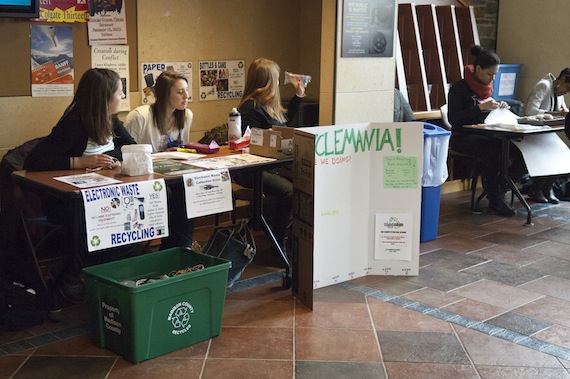
Recyclemania at Colgate. Photo by Duy Trinh ’14.
By Kathryn Bacher ’14
It’s almost second nature to me now. I rarely even think about it when I stretch for a plastic yogurt container, some remnants still inside, or retrieve a receipt that probably wouldn’t have taken up much space in the landfill anyways. Thankfully finding plastic water bottles is becoming rarer as my sermons begin to sink into my roommates’ heads. What about all of those other sermons though? How many times do I have to remind them that our county recycling center recycles all plastics and thus plastics should never be in our trash? Still I find myself picking and sorting through it daily.
If you ask my roommates, they might tell you that I am slightly extreme, but it is because recycling is too simple to not be done. It does get done in our house, but I have little faith it would if I wasn’t around. On Wednesday nights we put the recycling and trash by the curb, only to see that most others on the street have not separated their recyclables. If I struggle to convince my housemates, how can I convince my neighbors? Or the Colgate community? Or our entire society?
When that garbage truck pulls away Thursday morning, most people have no intention of ever seeing that trash again. It goes to some far away place for someone else to deal with. At Colgate, this far away place is about 20 miles from campus and is called the Madison County landfill.
Colgate sends over 1,500,000 pounds of trash to this landfill every year, which is responsible for about 240,000 pounds of greenhouse gas emissions and costs the university nearly $50,000 in tipping fees. However, about 30% of this “trash” turns out to be recyclable materials.
On a larger scale, according to the EPA, in 2011 alone, Americans generated about 250 million tons of trash and recycled and composted almost 87 million tons of this material, equivalent to a 34.7 percent recycling rate. On average, we recycled and composted 1.53 pounds of our individual waste generation of 4.40 pounds per person per day.
At Colgate, there are recycling bins in all the academic buildings and all the residence halls with signs denoting what is recyclable, but still negligence and laziness exists and trash is not sorted properly. So how can we encourage people to recycle?
Education is a good place to start. If people understand the impacts of what happens when they do and do not recycle, I think they would be more apt to change their behavior. First, recycling helps extend the life of many precious resources that are dwindling due to our consumption habits. Additionally, processing recycled materials takes much less energy to process than virgin materials. Most importantly, recycling keeps items out of the landfills, which are composed mostly of non-biodegradable waste. Once all the landfills are filled, our society will face a pressing question of where to put our trash.
Colgate will be having a waste week this academic year to emphasize just how much trash is generated from the first year residence halls. For one day, all the trash will be displayed on the academic quad instead of shipping it off to the landfill. From this demonstration, students will be able to clearly visualize the positive benefits of reusing and recycling old items. Make sure to check it out when you see it!
Next time you go to throw something out, take a second to think if what you are holding is recyclable. It really can make a difference to conserve precious raw natural resources and keep materials out of the landfill. Plus, others will learn from your example.
Want to learn how to recycle at Colgate in under two minutes? Check out this Sustainability Office video by Hugo Torres-Fetsco ’15:

